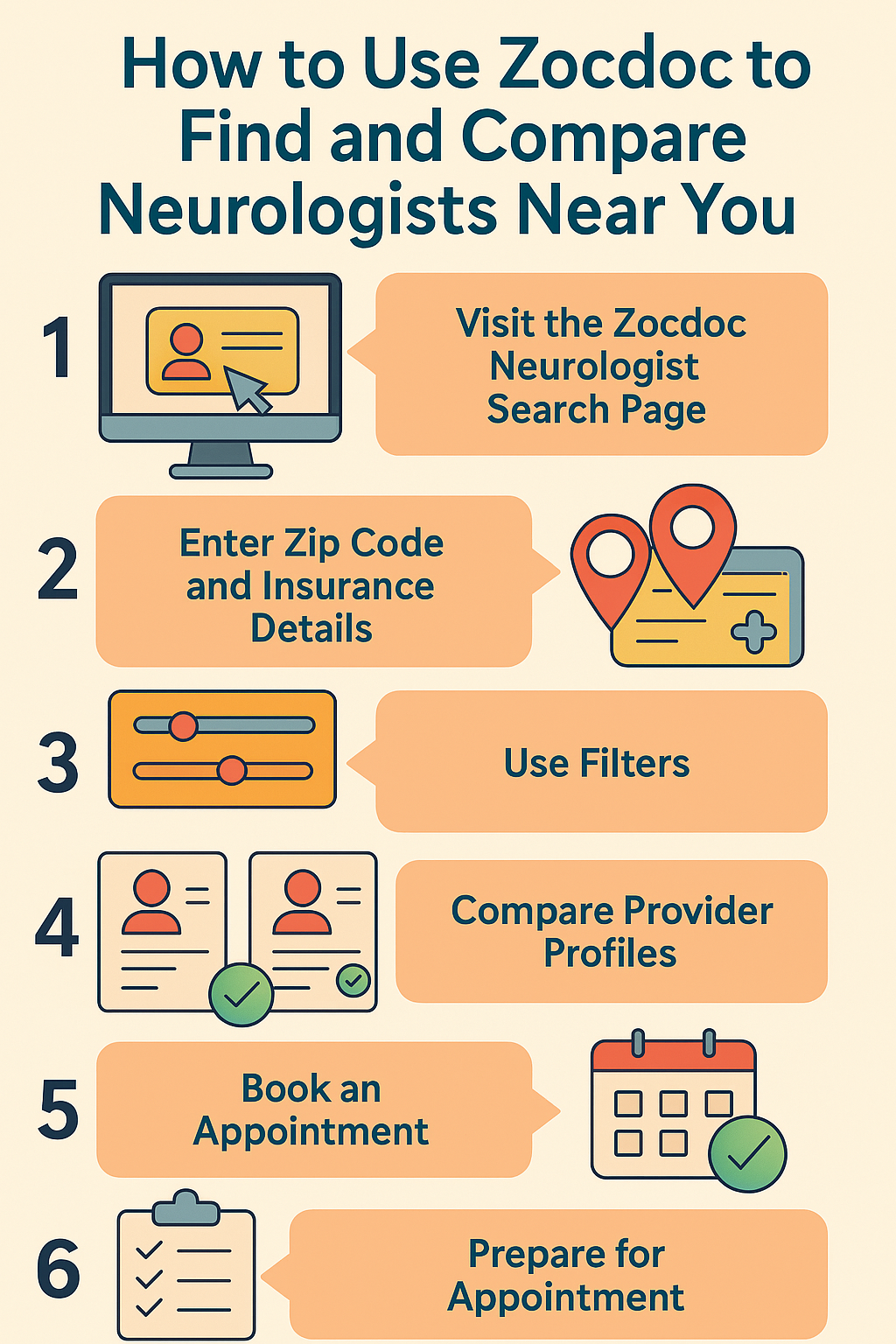Neurological health becomes more important with age, especially as concerns like memory issues, numbness, tremors, and balance changes become more common. Whether managing migraines, neuropathy, or more complex conditions like Parkinson’s or Alzheimer’s, working with a neurologist can help provide answers—and a plan. This guide explains how to find a qualified neurologist near home, what types of conditions they treat, and what to consider when comparing providers. With the right tools and preparation, it’s possible to make informed decisions that support brain and nerve health well into the future.
What Neurologists Do and When They Help
Neurologists are doctors who specialize in diagnosing and treating conditions that affect the brain, spinal cord, and nerves. Common reasons for seeking a neurologist include:
- Chronic or unexplained headaches or migraines
- Memory loss or confusion
- Tremors, shaking, or balance issues
- Numbness or tingling in hands or feet
- Seizures or episodes of fainting
- Stroke recovery and monitoring
“Neurologists focus on both diagnosis and long-term management,” explains Dr. Alicia Barnes, a neurologist and clinical researcher. “Some conditions progress slowly, while others can be stabilized or reversed with the right care.” [1]
Types of Neurologists and Subspecialists
Neurology includes a variety of subspecialties depending on the condition:
Type of NeurologistFocus AreaGeneral NeurologistBroad neurological disorders, common symptomsMovement Disorder SpecialistParkinson’s disease, tremors, dystoniaCognitive NeurologistDementia, Alzheimer’s, memory lossNeuromuscular SpecialistALS, muscular dystrophy, neuropathyHeadache SpecialistMigraine, cluster headaches, tension-type headachesEpileptologistSeizures and epilepsy
Primary care providers often refer patients based on symptoms and test results. However, individuals can also search and schedule appointments directly through trusted platforms.
How to Search for a Local Neurologist (Step-by-Step)
- Start with trusted directories like the American Academy of Neurology (AAN) or Medicare’s Physician Compare tool
- Search by ZIP code to limit results to providers near home
- Use filters on platforms like Zocdoc or Healthgrades to compare availability, insurance, and patient reviews
- Confirm board certification and hospital affiliations
- Call to verify specialty services, especially if a subspecialist is needed
“It’s a good idea to bring a list of symptoms and a copy of any past imaging or test results,” says Dr. Barnes. “Neurological issues often require detective work.”
Top Resources for Finding a Neurologist in 2025
- American Academy of Neurology (AAN)
- https://www.aan.com/Find-a-Neurologist
- Medicare Physician Compare Tool
- https://www.medicare.gov/physiciancompare
- Zocdoc – Search by Location and Condition
- https://www.zocdoc.com/neurologists
- Healthgrades – Neurologist Ratings and Reviews
- https://www.healthgrades.com
- National Institute of Neurological Disorders and Stroke (NINDS)
- https://www.ninds.nih.gov
🧭 Step-by-Step Guide: How to Use Zocdoc to Find and Compare Neurologists Near You
Zocdoc is one of the most trusted platforms for searching and booking healthcare providers, including board-certified neurologists. It allows filters by ZIP code, insurance, patient reviews, and appointment availability. Here's how to get started:
Step 1: Visit Zocdoc’s Neurology Search Page
🔗 Go to: https://www.zocdoc.com/neurologists
You’ll be taken to a search page where neurologists are listed by city or ZIP code.
Step 2: Enter Location and Insurance Details
- In the search bar, type your ZIP code or city and state
- Select “Neurologist” as your specialty
- Click the insurance filter to choose your provider and plan (e.g., Medicare, Aetna, etc.)
📌 Why it matters: Choosing the correct location and insurance ensures you only see doctors nearby who are in-network.
Step 3: Use Additional Filters to Narrow Results
Once the list of neurologists appears, you can refine it using:
- Patient rating (typically 1–5 stars)
- Gender preference
- Languages spoken
- Hospital affiliation
- Next available appointment (some show same-week availability)
💡 Tip: You can also filter by doctors who offer telehealth or accept new patients.
Step 4: Compare Profiles Side-by-Side
Click on a neurologist’s name to open their detailed profile, which includes:
- Education and board certification
- Years of experience
- Patient reviews and average rating
- Clinic location and contact info
- Accepted insurance
- Photos and video introductions (for some doctors)
✅ Checklist: Look for providers with 4.5+ star ratings, clear patient reviews, and a specialty in the condition you’re concerned about (e.g., memory care, migraines, neuropathy).
Step 5: Book an Appointment Online
Once you've selected a provider:
- Choose a time slot from the calendar view
- Click “Book Appointment”
- Enter your name, contact info, and reason for visit
- Some offices may confirm by phone or email
🗓 Appointments can often be scheduled within 2–7 days, especially for general neurology.
Step 6: Prepare for the Appointment
After booking:
- Make note of what documents to bring (ID, insurance card, referral if needed)
- Gather your medical history and symptom log
- Ask if there’s any required imaging or testing beforehand
🔍 Why Zocdoc Can Be Helpful for Seniors
- No need to call multiple offices
- Ability to read reviews and compare
- Shows providers who accept Medicare or private insurance
- Some offices offer virtual care
- Easy to reschedule or cancel online
Common Mistakes to Avoid When Seeking Neurology Care
- Waiting too long to address symptoms – Early evaluation can prevent long-term damage
- Overlooking the need for a referral – Some plans or providers require a referral for coverage
- Assuming all neurologists treat all conditions – Some may specialize in only one or two areas
- Skipping provider reviews or certifications – Experience and patient satisfaction matter, especially in specialized care
Brain and nerve health are central to aging well. Whether it’s occasional migraines, early memory changes, or movement concerns, neurologists can provide both clarity and guidance. With the right tools and a thoughtful approach, it’s possible to find a local provider who listens, explains options clearly, and helps map out a care plan that fits.
FAQs About Finding a Neurologist
Q: Does Medicare cover neurologist appointments?
Yes. Medicare Part B covers medically necessary visits with a neurologist, including consultations and some diagnostic testing.
Q: What symptoms suggest seeing a neurologist?
Common signs include memory changes, persistent headaches, tremors, numbness, or unexplained balance issues.
Q: How long does it take to get an appointment?
It varies. Some general neurologists have openings within weeks, while subspecialists may require longer wait times.
Q: Do neurologists treat migraines?
Yes. Many neurologists specialize in headache medicine or collaborate with headache specialists.
Q: Can telehealth be used for neurology?
Some neurologists offer virtual consultations for follow-ups or initial evaluations, though in-person exams are often needed for full diagnosis.
Helpful Resources
- AAN – Find a Neurologist
- https://www.aan.com/Find-a-Neurologist
- NINDS – Neurological Disorders & Patient Info
- https://www.ninds.nih.gov
- Zocdoc – Neurology Directory
- https://www.zocdoc.com/neurologists
- Medicare.gov – Specialist Finder
- https://www.medicare.gov/physiciancompare
Citations
[1] Interview with Dr. Alicia Barnes, Neurology & Aging Conference, January 2025
[2] American Academy of Neurology (AAN) – Find a Neurologist Directory
[3] Centers for Medicare & Medicaid Services – Specialist Coverage Fact Sheet (2024)
Disclaimer
This content is for informational purposes only and does not constitute medical advice. Always consult a licensed provider for individualized diagnosis and care.






